In the span of the last 10 days, Iran dropped its bid for a seat on the United Nations Human Rights Council, only to turn its sights instead on a position on a U.N. commission devoted to the protection of women’s rights. In the meantime, a senior Iranian cleric claimed that scantily clad women are an indirect cause of earthquakes, leading to a protest on social media sites around the world. No country in the world has a spotless human rights record, but Iran is a perennial target for human rights advocates for everything from its attacks on free speech […]
Iran Archive
Free Newsletter
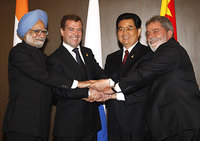
The summit meetings held last week in Brasilia — of both the India-Brazil-South Africa forum (IBSA) and the Brazil-Russia-India-China group (BRIC) — seem to confirm that any Iran sanctions resolution likely to secure passage in the United Nations Security Council will not live up to the Obama administration’s expectations. The leaders of the emerging “world without the West” — who all traveled to the Brazilian capital after attending the Nuclear Security Summit in Washington — were able to compare notes from their bilateral meetings with U.S. President Barack Obama as well as from other communications with senior U.S. officials. Indian […]
With the conclusion of the Nuclear Security Summit in Washington, Iranannounces its own nuclear conference. The gathering, being held onSaturday, is called “Nuclear Energy for All, Nuclear Weapons for Noone” and some countries such as Russia have said they will attend. AlJazeera’s Nazanine Moshiri talked with Manouchehr Mottaki, Iran’sforeign minister, and asked about the conference.
I could have included this in my previous post on President Barack Obama’s nuclear nonproliferation agenda, but it’s significant enough to warrant its own post. As Obama has pushed for UNSC sanctions against Iran, there’s been a lot of tea-leaf reading going on about Russia and China’s willingness to come on board. Parallel to that, there’s been a lesser amount of attention given to the “bad” UNSC that a sanctions resolution faces, and most notably Brazil and Turkey’s opposition to sanctions. But this week demonstrated how those tracks are far from parallel. So even while Russian President Dmitry Medvedev and […]
A couple scattershot thoughts on President Barack Obama’s nuclear nonproliferation agenda in the aftermath of this week’s Nuclear Security Summit: First of all, in combination, there’s no question that the follow-on START treaty, the Nuclear Posture Review and the nuke summit in Washington represent significant, if incremental, successes. From a political optics perspective, Obama achieved a high-priority agenda item, left his mark on a legacy item and demonstrated well-regarded global leadership, in that order. Anyone who doubts the potency of that sequence needs to check their head with a geiger counter. This was a good couple weeks for the president, […]
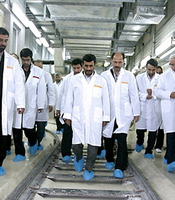
After months of speculation over whether Russia and China would come on board for a new round of sanctions against Iran, the parameters of a new United Nations Security Council resolution appear to be taking shape. Conversations between President Barack Obama and his Russian and Chinese counterparts, Dmitry Medvedev and Hu Jintao, at this week’s Nuclear Security Summit seem to have produced a consensus among the “permanent five” Security Council members. Two obstacles remain: the actual crafting of any resolution — and whether the final product will pass muster with the U.S. Congress. Up to now, the Obama administration has […]
Jim Lehrer speaks to Under Secretary for Arms Control and International Security Ellen Tauscher about Iran, China and the Nuclear Summit. Tauscher talks about the progress President Obama has made in his efforts to persuade countries attending the summit to better secure their nuclear stockpiles. She says that not only has Obama recieved a committment from attendees to better secure their nuclear material, but the group as also committed to reconvene in 2012 in South Korea to continue to tackle the issue. Having trouble viewing this video? Click here to watch.
Egypt’s Foreign MinisterAhmed Aboul Gheit talks to NewsHour aboutEgypt’s view of nuclear nonproliferation. Gheit says keeping nuclearmaterial and facilities under tight security is a chief concern in thefight for nuclear nonproliferation, but more importantly he says thatthe Middle East must create a nuclear-free zone. To this end, he saysthat Israel and Iran are the main obstacles to stability in the region,with a particular emphasis on Israel. As a neighbor of Israel and anNPT signatory, Egypt has categorically been opposed to Israel’s policyof ambiguity when it comes to their nuclear program. Having trouble viewing this video? Click here to watch.
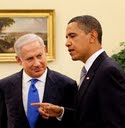
Today’s Nuclear Security Summit is the largest gathering of world leaders in Washington ever hosted by an American president. Despite the importance of this event, Israeli Prime Minister Benjamin Netanyahu decided to skip the meeting. His move highlights the problems the world’s leaders confront in preventing the feared wave of nuclear weapons proliferation in the Middle East. Until last week, Netanyahu had indicated that he planned to attend the summit in order to bolster efforts to prevent Tehran from using its civilian nuclear program to develop a nuclear weapons capacity. In addition to the formal sessions occurring yesterday and today, […]
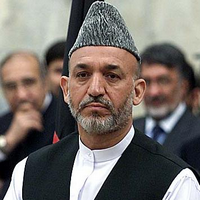
Is there a method to Afghan President Hamid Karzai’s “madness”? At first glance, his recent actions — including harsh criticism of U.S. policies, a threat to join the Taliban resistance, diplomatic maneuverings in recent visits to Tehran and Beijing, and outreach to former domestic enemies — might seem “troubling” at best, and “troubled” at worst. But on closer inspection, they all appear to have a logical purpose: to hedge Karzai’s bets. From Karzai’s perspective, there are three foreseeable outcomes of the Obama administration’s “surge” in Afghanistan — and only one would be particularly beneficial to his interests. That would be […]
As the 2010 Nuclear Posture Review is released, NewsHour’s Jeffrey Brown talks to Joseph Cirincione, president of the Ploughshares Fund, a foundation that promotes a nuclear-free world and Stephen Rademaker who has served in the administrations of both George H.W. and George W. Bush, focusing on arms control and proliferation issues. Cirincione says this NPR is “night and day” in comparison to the similar report conducted under the Bush administration that expanded the role of nuclear weapons in military operations. Conversely, Rademaker says that the most recent report is more verbiage than substance, with enough wiggle room to still use […]
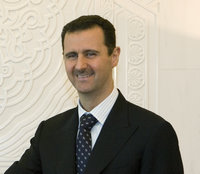
Of all the changes that have transpired on the global political scene in the last year or so, few are as dramatic as the re-emergence of Syria from a Washington-led campaign of international isolation. Just a few years ago, in the aftershocks of a ground-shaking political assassination in Lebanon, Syrian President Bashar al-Assad governed a country well on its way to becoming an international pariah. With Beirut and much of the world pointing an accusing finger in Syria’s direction after the killing of two-time former Prime Minister Rafik Hariri in February 2005, Damascus’ power quickly started shrinking. Shunned by its […]
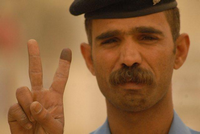
Five years ago, in an essay in National Interest, Paul Saunders and I attempted to address the question of what victory in Iraq would look like. We concluded that success would include depriving al-Qaida of a base, closing Iraq’s borders to foreign fighters, and the emergence of a central government capable of ensuring some degree of stability, without repressive methods or too close an alignment with Iran. “Americans and others will recognize victory,” we wrote, “if we have managed to break the back of al-Qaida in Iraq and left in place an Iraqi government committed and able to prevent the […]
